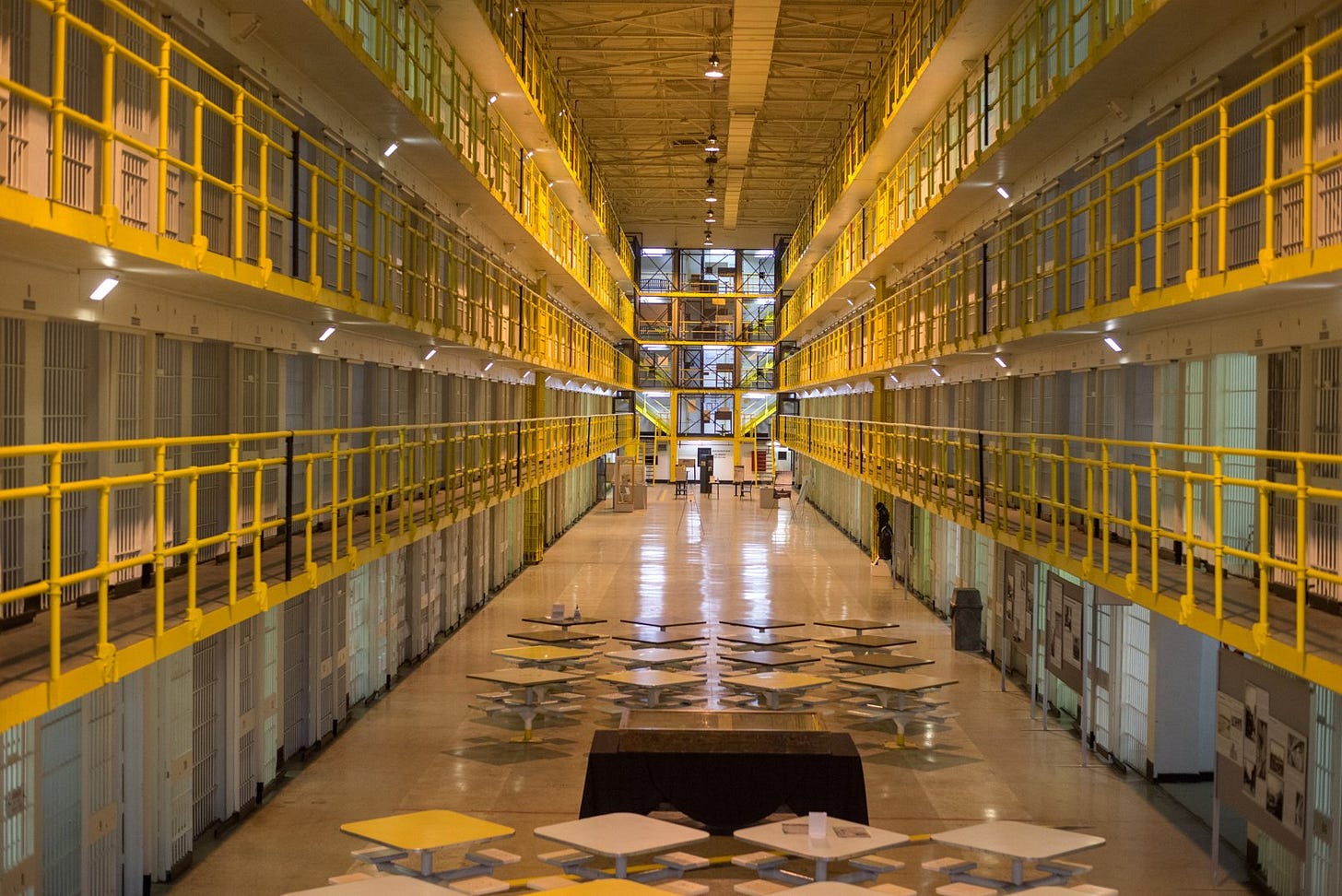Good Guys - Bad Guys
Last I saw this place was through the steel mesh windows of a prison van, shackled and belly-chained.
Jackson State Penitentiary. The largest walled prison in the world.
Concrete, razor wire, and five thousand angry men stacked in cages.
Rifles followed us across the yard, through processing, into cells barely wide enough to stretch our arms.
Gun barrels trained on us while we ate.
That was then.
Today I'm in work boots, khakis, and a polo, driving my own truck. Brand new.
The prison shrinks in my rearview, but just being this close prickles my skin.
Things look different on this side of the wall. Funny to see a Walmart here, people coming and going, oblivious to the terror percolating just behind us.
That’s when I saw him crossing the parking lot- impossible to miss, even out of uniform. That walk. Cool and confident. Narrow gaze, head on a swivel.
I'd recognize him anywhere.
Officer Higgins. One of maybe three guards in all of Jackson who looked us in the eye when he spoke. Called you by your name instead of your number. Asked about your family when mail came. Let conversations in the library run long, discuss books with you, instead of needle you for intel.
He stopped by the chapel the day I graduated. An associate's degree. Stood in back while families watched through reinforced glass. Twenty-seven inmates walked across a makeshift stage that day.
When they called my name, I saw him nod. Once. Quick enough, cameras wouldn't catch it. Long enough, I knew.
I couldn't pass this up.
I circled back, parked clean, between the lines, grabbed a cart I didn't need, and followed him inside.
I tracked him through produce, selecting items I never intended to buy. For once, I could observe him the way he'd observed us - exposed, uncertain, vulnerable.
He drifted through produce, squeezing avocados like he was checking for contraband. His wife whispered from the shopping list. Both of them so…normal.
I picked up a bag of oranges I didn't want, stayed close enough to hear him discuss dinner plans in his civilian voice - softer than his prison bark, uncertain in ways he never was on the yard.
Soup, cereal, ground beef in a Styrofoam tray. I put them in the basket so I'd look like everyone else.
I watched him check a carton of eggs, flip it open, shut it, set it down again, take another. His hands were steady. Confident. Same methodical care he used for everything inside.
Every inmate he treated with decency must have been a question mark in his mind. Every kindness, a potential liability. Every moment of humanity, a bet against statistics that say he'd lose.
But he'd bet against the odds anyway. Treated us like the twenty percent who might make it instead of the eighty percent who wouldn't.
I shadowed him through the aisles. We moved through frozen foods, past the bread.
He noticed, but didn't exactly. He didn’t miss much.
I was one of the tens of thousands of faces on rotation he’d seen over decades on the job.
He was one of the very few to me.
We ended up at checkout together—he and his wife ahead of me in line.
He laid his groceries on the belt—bread, coffee, apples. Stacked neat, like cataloged property.
The cashier asked his wife, "Paper or plastic?"
That's when he turned, met me eye-to-eye.
Years of faces must have flashed through his mind - thousands of men he'd watched come and go, come back again.
Couldn’t place me, I'd bet. Civilian clothes. Clean-shaven. Respectable.
His eyes showed recognition first, then a wariness. He narrowed me in his sights.
He knew exactly who I was then. We had history, he and I.
Five years of small rebellions against a system that demanded he see me as a number. But he'd looked at me and seen potential instead of pathology. Treated me like a man, not a mistake.
And now here I was, three years later, and he was calculating odds.
Had his faith been justified or naive? Had I made it or fallen back into old patterns?
Every decent gesture he'd offered was suddenly on trial in a grocery store checkout line.
I wanted to thank him. Wanted to shake his hand. Tell him his faith wasn't misplaced. Show him I was worth it—worth the risk of acknowledging my humanity in that inhumane place.
But what if he pulled away?
What if he looked at me the way policy dictates he should - like the statistical likelihood I'd always been?
The scanner kept beeping. The cashier kept filling bags.
He turned back, paid, and walked out with his wife.
I let him go.
I just stood there and let him go. Me, with my cart of props - oranges I didn't want, cereal I wouldn't eat, ground beef going warm.
The system thinks it breaks men by locking them in.
But the truth is, we carry each other out.
I know I’ve carried him with me all these years.
And I let him go without a word, taking his uncertainty with him.




Another great read Paul! I wish you’d been able to tell him, but sometimes no words are needed because the eyes say it all 🙏 Thank you for sharing your experience with us 😊